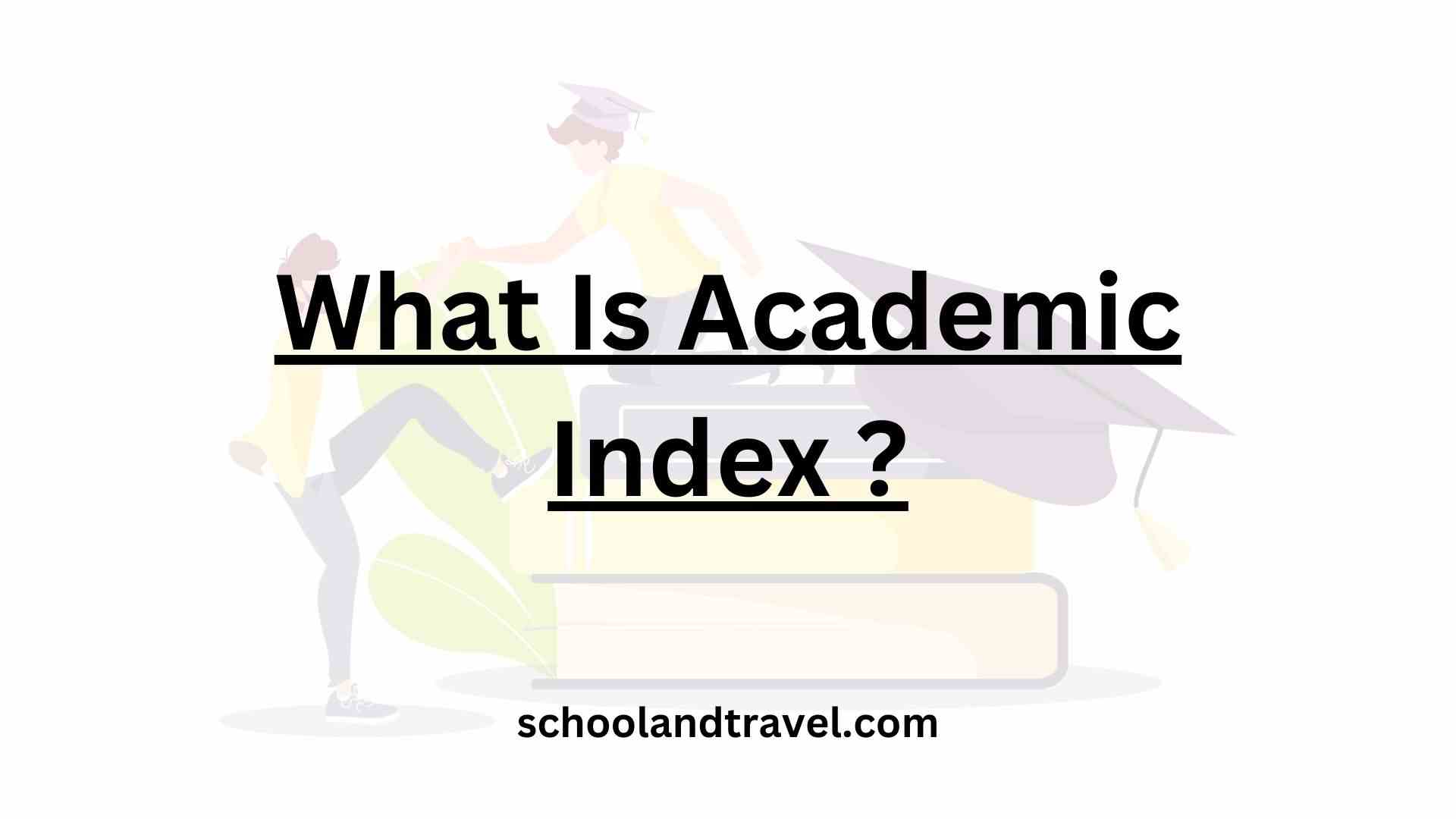The college admissions process can be complex and competitive, considering numerous factors when evaluating applicants.
One such factor is the Academic Index (AI), a numerical measure that helps colleges assess applicants’ academic qualifications.
This article will examine the concept of the Academic Index, its significance in college admissions, and how it is calculated.
Understanding AI and its components can provide valuable insights into how applicants are evaluated and help students gauge their academic competitiveness.
So, let’s explore what Academic Index is all about and learn how to calculate it.
What is Academic Index?
The Academic Index (AI) is a numerical measure used by colleges and universities to assess applicants’ academic qualifications.
It provides admissions officers a standardized way to compare and evaluate students from different schools and regions.
The AI considers various academic factors, including GPA, standardized test scores, and class rank.
GPA is a crucial component of the Academic Index. It reflects a student’s overall academic performance throughout high school.
Standardized test scores, such as the SAT or ACT, are another essential component of the Academic Index.
These scores provide a standardized measure of a student’s academic aptitude and are often used as predictors of success in college.
Why is Academic Index Important?
The Academic Index (AI) plays a crucial role in college admissions and holds significant importance for students and institutions.
Here are several reasons why the Academic Index is important:
1. Fair Evaluation
The college admissions process is highly competitive, with thousands of students vying for limited spots.
The Academic Index provides a fair and consistent way to evaluate applicants from diverse backgrounds, schools, and regions.
It ensures that all students are assessed based on their academic achievements, regardless of the high school they attended.
2. Identifying Academic Potential
The Academic Index helps colleges gauge applicants’ academic potential and likelihood of success at their institution.
It considers various academic factors, such as GPA, standardized test scores, and class rank, to assess a student’s academic abilities comprehensively.
This information aids admissions officers in selecting candidates who can thrive in the college’s academic environment.
3. Comparison Tool
Colleges can compare applicants on a level playing field with the Academic Index.
It allows admissions officers to see how one student’s academic profile measures up against others in the applicant pool.
This comparison aids in making well-informed decisions about which students are the best fit for the institution and its academic programs.
4. Merit Scholarships and Financial Aid
Many colleges use the Academic Index to award merit-based scholarships and financial aid.
Students with firm academic profiles may be eligible for various financial incentives, making college more affordable and accessible for them.
5. Determining Academic Rigor
The Academic Index considers the rigor of a student’s high school coursework, including advanced placement (AP) and International Baccalaureate (IB) classes.
Colleges value applicants who challenge themselves academically and have taken rigorous courses throughout high school.
6. Benchmark for Minimum Requirements
The Academic Index can serve as a benchmark for minimum academic requirements.
It helps colleges set standards for GPA, test scores, and class rank, ensuring that admitted students meet a certain academic threshold.
7. Holistic Admissions
While the Academic Index is essential, most colleges consider other student application aspects, such as extracurricular activities, essays, letters of recommendation, and demonstrated leadership.
However, the Academic Index provides a solid academic foundation upon which other aspects of the application are evaluated.
8. Transparency for Students
Understanding the Academic Index gives students insight into how they are evaluated during admissions.
It helps them identify areas of strength and areas that may need improvement.
With this knowledge, students can strategically choose colleges that align with their academic profile and aspirations.
How Is the Academic Index Calculated?
The Academic Index (AI) is calculated using a standardized formula combining various academic factors to numerically represent a student’s academic profile.
While the specific calculation method may vary slightly between institutions, the general principles remain the same. Here’s an overview of how the Academic Index is typically calculated:
1. GPA
The first step is determining the student’s Grade Point Average (GPA).
This is usually based on a 4.0 scale, where each grade is assigned a specific point value (e.g., A = 4, B = 3, etc.).
The GPA is typically calculated using a student’s high school transcript, considering grades earned in core academic subjects such as English, math, science, and social studies.
2. Course Rigor
The Academic Index also considers the rigor of the student’s high school coursework.
This includes factors such as the number of Advanced Placement (AP), International Baccalaureate (IB), or honors courses the student takes. Higher-level and more challenging courses contribute to a higher AI.
3. Standardized Test Score
Standardized test scores, such as the SAT or ACT, are often factored into the Academic Index calculation.
These scores provide an additional measure of a student’s academic ability and are typically converted into a standardized scale to align with the GPA.
4. Class Rank
Some institutions consider class rank as part of the Academic Index calculation.
Class rank represents a student’s relative standing within their graduating class based on GPA.
A higher class rank can positively impact the Academic Index.
5. Weighting and Scaling
Each component of the AI may be weighted differently to reflect its relative importance. For example, a higher weight might be assigned to standardized test scores or course rigor.
Additionally, the AI may undergo scaling to bring the numerical value within a specific range or to align it with the institution’s desired criteria.
Frequently Asked Question On Academic Index
The Academic Index plays a significant role in college admissions as it helps institutions evaluate the academic strength of applicants. A higher Academic Index indicates a more robust academic profile, which can increase the likelihood of acceptance into competitive schools. However, it’s important to remember that the Academic Index is just one aspect of the admissions process, and colleges consider other factors such as extracurricular activities, essays, recommendation letters, and personal qualities.
While a low Academic Index may pose challenges, it does not automatically exclude students from admission. Colleges consider a holistic view of applicants, including personal achievements, essays, and other strengths. A lower Academic Index can be compensated by exceptional accomplishments in other areas, unique talents, or overcoming challenging circumstances. Additionally, many colleges and universities have a more holistic approach to admissions and prioritize factors beyond the Academic Index.
No, the Academic Index is not the sole criterion for college admissions. It is an essential tool for evaluating academic performance, but institutions also consider other aspects of an applicant’s profile. Admissions committees assess extracurricular activities, leadership roles, community involvement, essays, recommendation letters, and demonstrated passion or talent in specific areas.
The goal is to evaluate applicants comprehensively and understand their potential to contribute to the college community.
Yes, the Academic Index can be improved through various means. Students can focus on achieving higher grades in their coursework, especially in core academic subjects. Challenging courses such as Advanced Placement (AP) or honors classes can also boost the Academic Index. Additionally, performing well on standardized tests like the SAT or ACT can positively impact the Academic Index. It’s important to note that improvement takes time and consistent effort, and students should also prioritize personal growth, learning, and pursuing their interests rather than solely focusing on the Academic Index.
Conclusion
The Academic Index is crucial in college admissions, providing colleges with a standardized measure to assess academic qualifications.
It visually represents an applicant’s academic profile and combines GPA, standardized test scores, and class rank.
By understanding the components and calculation of the Academic Index, students can gauge their academic competitiveness and take steps to improve their chances of admission.
However, it’s important to remember that AI is just one aspect of the holistic admissions process, and other factors like extracurricular activities, essays, and recommendations also hold significance.
By leveraging knowledge about Academic Index, students can confidently navigate the admissions journey and make informed decisions to achieve their academic goals.
Awesome one; I hope this article answers your question.
Editor’s Recommendations:
- 7+ Cheapest Online Schools in The World (FAQs)
- 11+ Online Schools that give Laptops & Refund Checks
- How to start an Online School (Steps, formats)
- 5 Easiest Traffic Schools Online in California (FAQs)
- 7+ Coding Internships For High School Students (FAQs)
- 7+ Tips To Find Internships in the UK as International Students
- 5 Best Law Internships For High School Students (FAQs)
- 5 Reasons To Do An Internship Abroad (Expert Research)
- What Does ‘HYPSM’ Mean? (Reasons, Features, FAQs)
- 7 Tips to Become a Successful Online College Student
- 10 Best Tools for Learning Spanish (Reasons, FAQs)
- The Role of Accreditation in Online High Schools
If you find this article good, please share it with a friend.




